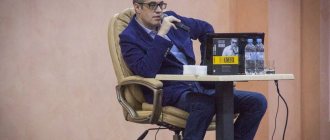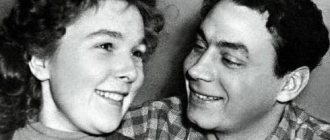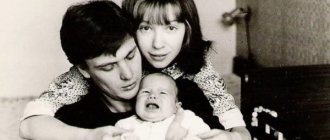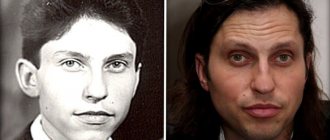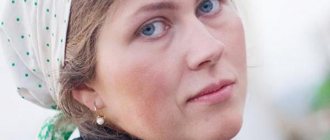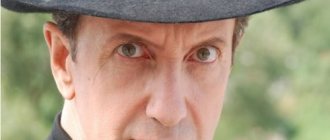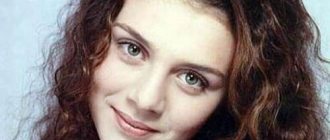Biography
Ada Rogovtseva is one of the most beloved actresses of Soviet cinema. Her heroines on the screen are sincere, proud and internally aristocratic women. The artist’s creative biography began in Ukraine, and she never betrayed her homeland and was not seduced by the opportunity to move to Moscow. Now Ada Nikolaevna is one of the ten most famous Ukrainian grandmothers, she still acts in films, and also participates in the political life of the country.
Actress Ada Rogovtseva
When relations between Russia and Ukraine fell apart, Rogovtseva said in the studio of the Inter channel that she did not intend to accept invitations from her Russian colleagues in the future. She was allegedly sentenced to 3 years for donating her earned fees to support the Ukrainian army.
This information has not been confirmed, but Ada Nikolaevna remains true to her position. The actress speaks of Russia as an aggressor country, she is afraid that she and her children will “be made slaves again,” and in an interview with Radio Liberty she admitted that the main relic in the house is a flag with the autographs of Right Sector participants.
Ada Rogovtseva with Ukrainian fighters
Nevertheless, Rogovtseva starred in the series “Fern Flower,” directed by a Russian director.
Awards and titles[ | ]
- Hero of Ukraine with the award of the Order of the Power (July 12, 2007) - for selfless service to Ukraine in the field of theater and cinema, affirmation of the ideals of spiritual beauty, human dignity and goodness, many years of ascetic creative activity
[9][10] - Honored Artist of the Ukrainian SSR (1960)
- People's Artist of the Ukrainian SSR (1967)[11]
- People's Artist of the USSR (June 16, 1978) - for great services in the development of Soviet theatrical art
[12] - Honorary citizen of Kyiv (2007)[13]
- Honorary citizen of Glukhov (2008)
- Best actress of the year according to a poll by the magazine “Soviet Screen” (1971)
- Order of Merit, 1st degree (January 16, 2009) - for significant personal contribution to the consolidation of Ukrainian society, the restructuring of a democratic, social and legal state and on the occasion of the Day of Unity of Ukraine
[14] - Order of Merit, 3rd degree (July 21, 1997) - for significant personal merits in the development of national culture and art, significant creative achievements
[15] - Order of Princess Olga, III degree (August 22, 2002) - for significant personal contribution to the socio-economic and spiritual development of Ukraine, significant labor achievements and on the occasion of the 11th anniversary of Ukraine’s independence
[16] - Anniversary medal “25 years of independence of Ukraine” (August 19, 2016) - for significant personal merits in the formation of independent Ukraine, the establishment of its sovereignty and strengthening of international authority, significant contribution to state building, socio-economic, cultural and educational development, active socio-political activity, conscientious and impeccable service to the Ukrainian people
[17] - Order of Friendship (July 9, 2007, Russia) - for great contribution to the strengthening and development of Russian-Ukrainian cultural ties
[18] - Order of the Red Banner of Labor
- Order of the Badge of Honor
- Medal “For Valiant Labor. In commemoration of the 100th anniversary of the birth of Vladimir Ilyich Lenin" (1970)
- Medal "In memory of the 1500th anniversary of Kyiv" (1982)
- Medal "Veteran of Labor"
- State Prize of Ukraine named after Alexander Dovzhenko (September 7, 2017) - for outstanding contribution to the development of Ukrainian cinema
[19] - State Prize of the Ukrainian SSR named after T. Shevchenko (1981) - for performing the roles of Lyubov Andreevna Ranevskaya, Lesya Ukrainka, Nadezhda Gavrilenkova in the plays “The Cherry Orchard” by A. P. Chekhov, “Hope” by Yu. Shcherbak, “The Mistress” by M. Garayeva
- Prize of the Lenin Komsomol of the Ukrainian SSR. N. Ostrovsky (1971)
- Prize of the VII Moscow International Film Festival for Best Actress (film “Salute, Maria!”, 1971)
- “Kiev Pectoral” Award in the category “Best Actress” (Paola in the play “The Lady Without Camellias” by T. Rattigan) (1991-1992)
- Crystal Elephant Award in the category “Outstanding Acting Family” (1996)
- “Kiev Pectoral” Award in the category “Best Actress” (Rosalie in the play “Deceived” by T. Mann) (1997)
- Prize "Kiev Pectoral" in the nomination "For significant contribution to theatrical art" (2004)
- Winner of the national campaign “Star of Ukraine” in the category “Star of Ukrainian Art” (2004)
- International Producer Film Festival “Kino-Yalta” (Special Prize “For Loyalty to the Profession”, 2007)
- International N.V. Gogol Prize in Italy (2012)[20]
- “Kiev Pectoral” Award in the category “Best Actress” (Claude in the play “Sounds Like Happiness” by P. Palmada and C. Duturon) (2015)
- Prize of the Union of Theater Workers of Ukraine named after M. K. Zankovetskaya
Childhood and youth
Ada Nikolaevna was born in the small town of Glukhov, in the Sumy region, 2 years before the start of World War II. The girl’s mother worked as an agronomist, and her father served in the NKVD; the young couple’s son, Slava, was already growing up. When the USSR became embroiled in hostilities, the Rogovtsev family ended up in Odessa. There, Nikolai Ivanovich, the head of the family, tried to organize the evacuation of his relatives via the ferry crossing.
Anna, his wife, was pregnant at that time, and therefore neither she nor the children had time to board the plane. This saved their lives. The ferry that the Rogovtsevs were supposed to take exploded a few minutes after it left the shore.
Ada Rogovtseva in her youth
After this incident, Anna Rogovtseva and her children returned to Glukhov, and Nikolai Ivanovich went to Moscow, where he served as Nikita Khrushchev’s security guard. Towards the end of the war, the head of the family managed to get a room for his relatives in a communal apartment in Kyiv, and soon they all moved to the capital of the Ukrainian SSR.
The Rogovtsevs lived not richly, but amicably, and even in friendship with their neighbors. The actress later spoke about those times with subtle irony and warmth. A few years later, when Ada was already in the 5th grade, her father was transferred again, this time to Poltava, where the food supply was better than in Kyiv. The hunger that had haunted the family all this time receded.
Ada Rogovtseva in her youth
In this fertile land, Ada graduated from school. Studying was easy for a talented and diligent girl, and, in addition to the classes themselves, Rogovtseva was often busy in amateur performances and willingly performed poems, both classical and her own.
In addition, she participated in theatrical productions. In her senior year, Ada planned to enroll in the Faculty of Journalism, but after thinking about it, she decided to take a risk and applied to the Kiev Theater Institute named after Karpenko-Kary.
Childhood
Ada was born into the family of an agronomist and a security officer.
Her childhood passed during wartime. The Rogovtsevs met the beginning of the war in Odessa. There, her dad organized the evacuation of people. Despite this, Ada and her family were unable to evacuate. They were late for the ship, fortunately, since it exploded right before their eyes. The Rogovtsevs had to leave for their native Glukhov. Ada Rogovtseva recalls that the most vivid memory from childhood for her is the New Year of 1941. Then the girl was 4 years old. On December 31, she felt an unusual smell at home, went into the room and saw a Christmas tree there. Then Ada realized that a real fairy tale was coming. Mom drew white “snow” footprints with chalk for the Christmas tree, and put toys under it. On that New Year's Eve, by the way, the mother of the future actress felt bad, then doctors diagnosed her with a combined heart defect.
Before the end of the war, my father moved his family to Kyiv, where he found Ada and her two brothers in the Victory Parade. By the way, the girl’s existence was darkened then by her father’s drunkenness. Unfortunately, the actress’s brothers also became addicted to alcohol early on. This also affected my mother’s health. At the age of 49 she became paralyzed, and at 53 she died.
Talented actress
Ada Nikolaevna is sure that from her mother she received the gift of forgiveness, and from her father - an easy attitude towards money and life.
Ada planned to enroll in the journalism department, but her friends dissuaded her from such a decision. And they forced her to take exams at the theater institute. By the way, the girl constantly performed at evenings at school, sang and acted in plays. In 1954, Rogovtseva was a first-year student at the Kyiv Theater Institute.
At the university, the artist met her future husband, Konstantin Stepankov. This is Ambrose Buchma’s favorite student; the institute hired him as a teacher. In 1959 the couple got married.
On the seashore
It is worth noting that fate turned out to be favorable to Ada. At the age of 18, the girl began to receive a Stalinist scholarship, and at the age of 23 she received the title of Honored Artist of Ukraine. Moreover, at the age of 30 she became the People's Artist of the country, and 10 years later she became the People's Artist of the USSR.
Theater
The young student was one of the best students of the course. Teachers noted her talent, hard work and perseverance. Soon Ada became a Stalinist scholarship recipient. In her 4th year, Rogovtseva’s acquaintance, theater and film actor Oleg Borisov, invited the promising artist to the Lesya Ukrainka National Art Theater Theater.
Ada Rogovtseva performed on the stage of the theater. L. Ukrainki
Already in 1959, the girl made her debut in the leading role in the production of “The Youth of Poli Vikhrova.” Such rapid career growth was possible, among other things, due to the fact that young Rogovtseva was the youngest in the cast, and she had practically no competition.
At the age of 23, Ada received the title of Honored Artist of the Ukrainian SSR. By that time, yesterday’s graduate had managed to play 3 main roles in plays. Since 1960, there has rarely been a season without new plays in which Ada Rogovtseva did not play leading roles. In 1967, the young actress embodied the image of the Polish girl Helena Modlewska from the play “Warsaw Melody” on the stage of her native theater and did it so well that theater critics immediately began to praise the performer.
Actress Ada Rogovtseva
Over 3 decades in the academic theater of Russian drama, Rogovtseva performed over 50 roles, including 5 characters in the production of Peer Gynt. The artist has worked with many talented directors. Among them is the eccentric Roman Viktyuk, who appreciates the actress’s dramatic talent.
After a new artistic director, Mikhail Reznikovich, appeared in the theater, the atmosphere in the team began to heat up. The administrator began to remove inconvenient people from the theater. According to Ada Nikolaevna, she became Reznikovich’s main enemy. Soon the actress was forced to take up Eduard Mitnitsky’s offer and start working at the “On the Left Bank” theater.
Ada Rogovtseva and Roman Viktyuk
In the 2000s, Ada Rogovtseva was received by Roman Viktyuk, an old friend and admirer. The collaboration with this director’s theater lasted several years; together they created a play dedicated to the last years of Lesya Ukrainka’s life, where the actress played the role of the great poetess. After this, Ada Nikolaevna participated a lot in enterprise performances.
The artist collaborates with the Constellation Theater, where her daughter Ekaterina works as a director.
Theater works[ | ]
National Academic Theater of Russian Drama named after Lesya Ukrainka (Kyiv)
- 1959 - “The Youth of Polya Vikhrova” by L. Leonov - Polya Vikhrova
- 1959 - “Comrades of Romance” by M. Sobol - Alyonushka
- 1959 - “Mashenka” by A. Afinogenov - Mashenka
- 1960 - "" M. Gorky - Vera
- 1962 - “Before Dinner” by V. Rozov - Irina
- 1962 - “Ward” by S. Aleshin - Nurse
- 1963 - “At the Lower Depths” by M. Gorky - Natasha
- 1963 - “Turn of the Key” by M. Kundera - Alena
- 1963 - “Kiev Notebook” by V. Sobko - Valya
- 1963 - “” according to D. Granin - Zhenya
- 1964 - “Plato Krechet” by A. Korneychuk - Mike
- 1964 - “104 pages about love” by E. Radzinsky - Natasha
- 1965 - “Distant Windows” by V. Sobko - Sonya
- 1965 - “Who's for it? Who's against it? P. Zagrebelny - Tanya
- 1966 - “Virgin Soil Upturned” after M. Sholokhov - Varyukha
- 1966 - “Today and Everyday” by V. Dragunsky - Irina
- 1966 - “My Mocking Happiness” by L. Malyugin - Lika Mizinova
- 1966 - “Walking through torment” according to A. Tolstoy - Dasha
- 1967 - “Warsaw Melody” by L. Zorin - Gelena Modlevskaya
- 1967 - “Marriage by Competition” by C. Goldoni - Lisette
- 1969 - “Justice is my craft” by L. Zhukhovitsky - Mukhin
- 1970 - “Destruction” according to A. Fadeev - Varya
- 1971 - “Someone Must” by D. Granin - Klava
- 1971 - “The Stone Lord” by L. Ukrainka - Dolores
- 1973 - “Dowry” by A. Ostrovsky - Larisa
- 1974 - “The Last Days” by M. Bulgakov - Natalie Goncharova
- 1975 - “Evening Light” by A. Arbuzov - Tamara
- 1975 - “Russian People” by K. Simonov - Valya
- 1975 - “The Strange Doctor” by A. Sofronov - Trubachev
- 1976 - “Ivanov” by A. Chekhov - Sasha
- 1976 - “The Importance of Being Earnest” by O. Wilde - Cecilia
- 1978 - “The Mistress” by M. Garayeva - Gavrilenkova
- 1979 - “Hope” by Yu. Shcherbak - Lesya Ukrainka
- 1980 - “Please include it in the transcript” by R. Fedenev - Frunov
- 1980 - “The Cherry Orchard” by A. Chekhov - Ranevskaya
- 1981 - “Counterpart” by V. Vrublevskaya - Anna
- 1982 - “The Gambler” after F. Dostoevsky - Blanche
- 1983? — “Peer Gynt”, a literary and musical composition based on G. Ibsen; dir. /Concert performance - Åse, Solveig, Woman in Green, Ingrid, Anitra, Doctor in a Madhouse
- 1983 - “Filumena Marturano” by E. de Filippo - Filumena Marturano
- 1984 - “Stove on a Wheel” by N. Semyonova - Frosya
- 1985 - “Private Soldiers” by A. Dudarev - Vera
- 1985 - “Calling” by V. Vrublevskaya - Julia
- 1986 - “Mother Courage and Her Children” by B. Brecht - Mother Courage
- 1987 - “And this one fell out of the nest” by D. Wasserman based on the novel “One Flew Over the Cuckoo’s Nest” by K. Kesey - Sister Krysched
- 1987 - “Sacred Monsters” by J. Cocteau; dir. R. Viktyuk - Esther
- 1988 - “Mother-of-pearl Zinaida” M. Roshchina - Patricia
- 1992 - “The Lady without Camellias” by T. Rattigan; dir. R. Viktyuk - Paola
- 1992 - “The Mystery of the Vernier House” by R. Thom, based on the story “The Unexpected Guest” by A. Christie; dir. N. Baturina - Laura Vernier
- 1993 - Benefit performance “Good - I give!..”, based on the plays of A. Dyachenko; dir. K. Stepankov
- 1993 - “Five pounds of love” based on the play “The Seagull” by A. Chekhov; dir. E. Mitnitsky - Arkadina
- 1997 - “Sun Set Boulevard” by C. Brackett, B. Wilder and M. Marshman Jr.; dir. R. Viktyuk - Norma Desmond
TheaterDom (St. Petersburg)
- 2000 - “Doves” [en]; dir. V. Dolgachev - Lilian
- 2004 - “My Precious Treasure” by V. Verbin; dir. B. Milgram
National Academic Drama Theater named after Ivan Franko (Kyiv)
- 2003 - “Warsaw Melody - 2” by L. Zorin; dir. I. Afanasyev/"Milennium-Art" (USA) - Gelena
[18][19] - 2007 - “The Quality of a Star” by N. Coward; dir. A. Lisovets - Prima Donna
Kiev Academic Drama and Comedy Theater on the left bank of the Dnieper
- 1997 - “Deceived” by T. Mann; dir. D. M. Bogomazova - Rosalie
- 2009 - “Pink Bridge” by R. J. Waller; dir. — Francesca Johnson
- 2010 - “Vasya must call” by K. Rubina; dir. E. Stepankova - Ruta
Kyiv Academic Theater Art Workshop "Constellation"
- 1995 - “I’m Not Afraid of the Gray Wolf” by E. Albee; dir. A. Zholdak - Martha George
- 2009 - “Make yourself at home” by J. Chevre; dir. E. Stepankova - Morion Dupre
- 2014 - “Seems like happiness” and; dir. E. Stepankova - Claude
(London)
- 2018 - “What the hell!” I. Ioannesyan, N. Boltyanskoy; dir. A. Mankovskaya - Anna Andreevna
Movies
Ada Nikolaevna began participating in film production while still a first-year student. In 1956, the first film with the participation of the actress was released - the film “Bloody Dawn”, where Rogovtseva played a minor role. Over the course of a decade and a half, Ada participated in a number of other projects, appearing on screen for just a couple of minutes.
Ada Rogovtseva in the film “Bloody Dawn”
In 1970, a film was released that made Ada Rogovtseva famous throughout the USSR - the two-part military drama “Salute, Maria!” There, the young actress reincarnated as underground worker Maria, a girl with a difficult and tragic fate. Ada became so popular that readers of the Soviet Screen magazine awarded her the title of best actress. The film itself was seen in cinemas by 17 million viewers.
In 1971, young Rogovtseva took part in the film adaptation of the play “The Stone Master.” Her partner on the set was Bogdan Stupka. In the film about space exploration, Taming of Fire, Ada played the wife of the general designer (Kirill Lavrov). The film was awarded the main prize at the Karlovy Vary Film Festival.
Ada Rogovtseva and Kirill Lavrov in the film “The Stone Master”
Then came the work that is still considered the most striking in the artist’s filmography and by which she is primarily recognized - the serial drama “Eternal Call”. Rogovtseva starred in the role of a woman humiliated by her own father, who married an unloved man and spent her entire life hiding her feelings towards another man.
In the melodrama “A Father Had Three Sons,” Ada Nikolaevna appeared as the mother of a family within which a conflict flared up, and only tragedy united its members.
Ada Rogovtseva in the melodrama “A Father Had Three Sons”
The actress often had to play mothers, wives, grandmothers, in general, heroines who live by caring for others, who understand everything and forgive everything.
These characters, if they do not sacrifice their own interests, then push them far into the background. For example, “Elegy near Moscow”, “Seventeen left boots”, “Tomorrow will be tomorrow”, “Hunting for red deer”.
Ada Rogovtseva on the set of the melodrama “Two kilometers from the New Year”
However, in the drama “Winter Romance,” the heroine Rogovtseva becomes tired of such an existence, and her decision to leave home for a casual acquaintance plunges her loved ones into shock. Ada created the same kind of strong-willed women who decide to radically change their fate in the melodrama “Caucasus” and the melodrama “Two Kilometers from the New Year.”
Rogovtseva Ada Nikolaevna
Born on July 16, 1937 in the city of Glukhov, Sumy region in Ukraine.
Graduated from the Kiev Theater Institute named after I.K. Karpenko-Kary (1959, master K. Stepankov).
In 1959-1994 - actress of the National Academic Russian Drama Theater named after Lesya Ukrainka in Kyiv.
She was engaged in teaching activities - she taught at the Kiev Institute of Theater Arts named after Karpenko-Karsky; was a member of the Soviet Peace Committee and takes an active part in public life.
The author of poetry collections - the Ukrainian “Mother’s Prayers” and the Russian “I Kiss Your Voice”, wrote a book about her husband “My Kostya”.
In the mid-90s, after leaving the Lesya Ukrainka Theater, she toured with concert programs. In 2007-2009, she was an actress at the Kyiv State Academic Drama and Comedy Theater on the left bank of the Dnieper, where she was involved in the play “Pink Bridge” (dir. E. Stepankova) - Francesca Johnson.
He actively acts in films and works in enterprise performances in Moscow and Kyiv.
Honored Artist of the Ukrainian SSR (1960), People's Artist of the Ukrainian SSR (1967). People's Artist of the USSR (1978), Hero of Ukraine (2007).
Member of the Television Academy of Arts of Ukraine (1997). theatrical works by Gelen (“Warsaw Melody”), Lesya Ukrainka (“Hope”), Paola (“The Lady without Camellias”), Ranevskaya (“The Cherry Orchard”), Esther (“Sacred Monsters”).
Workshop of theatrical art "Suzir'ya": "Make yourself at home" (dir. E. Stepankova) - Morion Dupre, Kiev Theater named after I. Franko: "Quality of a star" (dir. - A. Lisovets). prizes and awards Order of the Badge of Honor Order of Princess Olga, III degree (2003) Order of Merit, III degree Order of Friendship (2007, for great contribution to the strengthening and development of Russian-Ukrainian cultural ties. State Prize of the Ukrainian SSR named after T. G. Shevchenko (1981) - for playing the roles of Lyubov Andreevna Ranevskaya, Lesya Ukrainka, Nadezhda Gavrilenkova in the plays “The Cherry Orchard” by A. P. Chekhov, “Hope” by Yu. Shcherbak, “The Mistress” by M. Garayeva Lenin Komsomol Prize of the Ukrainian SSR named after N. Ostrovsky (1971) Prize of the Union of Theater Workers named after M. Zankovetskaya. Hero of Ukraine July 12, 2007 (for selfless service to Ukraine in the field of theater and film arts, affirmation of the ideals of spiritual beauty, human dignity and goodness, many years of ascetic creative activity). Best actress of the year. according to a survey by the magazine "Soviet Screen", (1971) Winner of the VII MIFF Prize for Best Actress (1971, for the film "Salute, Maria!") Winner of the Crystal Elephant Award in the category "Outstanding Acting Family" (1996) Winner of the Theater Prize “Kiev Pectoral” for the best actress (1997, for the play “Deceived”) Laureate of the “Kiev Pectoral” Theater Prize for outstanding contribution to theatrical art (2004) Winner of the national campaign “Star of Ukraine” in the category “Star of Ukrainian Art” (2004) Winner of the Special Prize “For Loyalty to the Profession” at the producer film festival “Kino-Yalta 2007” Honorary Citizen of Kyiv (2007).
movie roles 2013 I'm near (Ukraine) 2013 Pensioners :: Henrietta Semechko :: main role 2013 Where there is happiness for me :: Vera Ivanovna 2013 Rare blood type :: Olga Igorevna 2013 Agent :: Ada 2012 Lucky ticket (Russia, Ukraine) :: Anna Grigorievna 2012 Silvery ringing of the stream :: Baba Shura :: main role 2012 Dreaming is not harmful (Ukraine) :: Anna Ivanovna 2012 My Mommy :: Galina Ivanovna 2012 Waiting list (Russia, Ukraine) :: Vera Yakovlevna 2012 Cordon investigator Savelyeva (Russia, Ukraine) :: Angelina Stepanovna 2012 Defender :: Serafima Ivanovna 2012 Efrosinya (all seasons) (Russia, Ukraine) :: Maria Leontievna 2012 Lovers in Kiev (film almanac) (Ukraine) 2011 Smile of fate :: Vera Sergeevna: : main role 2011 Dark Waters :: Aunt Nyura 2011 Dance of Our Love (Russia, Ukraine) :: Valentina :: main role 2011 Brothel Lights :: Efrosinya Petrovna 2011 “Cedar” pierces the sky :: Olga Ivanovna (Helga Schloss) 2010 I am you I won’t give it to anyone (Russia, Ukraine) :: Rimma Ivanovna 2010 Brand :: Olga Luganskaya :: main role 2010 Herbarium of Masha Kolosova (Russia, Ukraine) :: Misha’s mother 2009 Taras Bulba (Russia, Ukraine) :: Taras’ wife 2009 On the open water :: Dulcinea 2009 It's me (Ukraine) :: Oksana Nikolaevna 2009 Shark (Ukraine) :: Lydia Petrovna 2009 1941 (Ukraine, Russia) :: Baba Katya 2008 I'll be back :: Grandma 2008 Black dress (Ukraine) :: Zinaida Fedorovna 2008 Provincial :: Igor's mother 2008 Adventures on a farm near Dikanka :: Baba Ganna 2008 Lonely (Russia, Ukraine) :: Violetta Pavlovna 2008 Inheritance :: Svetlana Petrovna Prokhorova 2008 Mavka :: Dulcinea 2008 Clowns (Russia, Ukraine) 2008 Ermolovs :: Antonina Konstantinovna Ermolova :: main role 2008 Blessed (Russia, Ukraine) :: Prokhorov's wife 2008 Admiral :: Anna Timireva in old age 2007 Kill the snake :: Natalya Dmitrievna 2007 Paid with death :: Aurora Morozova :: main role 2007 Male intuition (Ukraine) :: Kirill's mother 2007 Caucasus (Azerbaijan, Russia) :: Maria :: main role 2006 Flowers for the Snow Queen :: Zhanna Semyonovna 2006 Utyosov. A song that lasts a lifetime :: Elena in adulthood 2006 Prescription happiness :: Evgenia Veniaminovna :: main role 2006 My general :: Eleonora Yakovlevna :: main role 2006 Nine Lives of Nestor Makhno :: Evdokia Makhno 2005-2006 Plus infinity :: secretary 2005 Hunting for the red deer :: Irina’s grandmother 2005 Bat (Ukraine) :: grandmother 2004 To you, the real one (Ukraine) :: Vera Alekseevna 2004 Panna (Ukraine, short film) 2004 They danced the same winter :: Inna Ilyinichna 2004 Winter romance :: Nina Petrovna :: main role 2004 Two kilometers from the New Year (Ukraine) :: Ada 2004 December 32nd :: Margarita Nikolaevna :: main role 2003 Northern Sphinx :: Vera Semenovna Proselkova 2003 Tomorrow will be tomorrow (Ukraine, Russia) :: director of the orphanage 2002 Shukshin's stories :: Otavina 2002 Elegy near Moscow :: Varvara Petrovna Cherkasskaya :: main role 2002 Nero Wolfe and Archie Goodwin :: widow 2002 Bad habit :: Aunt Polya :: main role 2001 On the field of blood. Aceldama | On a field of blood. Aceldama (Ukraine) :: Michal 1998 Two moons, three suns (Ukraine, Russia) :: Alexei's mother 1993 Thank you!.. (Ukraine, film-play) :: She :: main role 1992 Four sheets of plywood | Chotiri leaves plywood (Ukraine) :: mother 1990-1991 Seventeen left boots :: Tatyana Sergeevna 1986 Mother, dear, beloved.. :: doctor 1986 In one single life :: Irina 1985 Men are men :: Vera Vasilievna :: home role 1985 Karmelyuk :: Olga Timofeevna 1983 The last argument of kings :: Esther Townsend 1983 High standard :: Olga 1982 Discovery :: main role 1981 Autumn road to mother (short film) :: Tatiana Kirillovna 1981 Little Bear :: Alpatov's wife :: main role 198 1 The father had three sons :: mother :: main role 1980 Gadfly :: Julia Burton 1980 Prisoner of Second Avenue (film-play) 1979 Family circle :: Somova Tatyana Mikhailovna :: main role 1979 Poem about wings :: Yulia Nikolaevna Tupoleva 1979 Autumn history :: Anna Georgievna Zorina :: main role 1979 Summer holidays 1979 Kiev meetings (film almanac) :: Maria :: main role 1978 The Hostess (film-play) 1978 On the eve of the premiere :: Ksenia Pavlovna 1978 Sea :: Vera 1978 Children are like children: : Tanya 1977 My mocking happiness (film-play) :: Lika Mizinova 1977 Girl, do you want to act in films? :: Vera Fedorovna 1975 Waves of the Black Sea :: Tatyana Ivanovna 1974 Difficult floors :: Lydia Severtsova 1974 Knight Vasya (short film) 1973-1983 Eternal call :: Anna Kaftanova (Savelyeva) :: main role 1973 Diary pages :: Isabella 1972 Taming the Fire :: Natalya Bashkirtseva :: main role 1971 The Stone Master | Kaminny Gospodar (film-play) :: Donna Anna 1971 Just three weeks :: Lyudmila 1970 Salute, Maria! :: Maria Tkacheva :: main role 1969 Heavy Ear :: Dasha 1961 Forest Song :: Field Mermaid 1960 Flying Ship :: Swan 1959 When Youth Begins :: Marina :: main role 1958 Flags on the Towers :: Oksana Litovchenko 1957 Shelmenko the Batman :: Prysinka 1957 The End of Chirva-Kozyr :: Oksana 1956 Pavel Korchagin :: Christina 1956 Bloody Dawn :: Gafiyka 1956 When the Nightingales Sing :: Maryana Kudelya
participation in films 2010 Ekaterina Vasilyeva. Flying from shadow to light (documentary) 2007 Ada Rogovtseva. “I died with him (documentary) 2005-2007 How idols left (documentary)
Personal life
Young Ada met her husband Konstantin Stepankov when she entered university - her future husband taught in her course. Feelings between the young people flared up quite quickly, but the couple waited until Rogovtseva graduated from the institute, and only then Konstantin proposed to his beloved. In 1962, a son, Kostya, was born into the family, and 10 years later, a daughter, Ekaterina, was born.
Ada Rogovtseva with her husband Konstantin Stepankov and daughter
Konstantin Petrovich did not live to see his golden wedding for 5 years. The actor died long and painfully, the family fought for his life, but Stepankov died in 2004. Eight years later, another tragedy occurred: Konstantin Jr., Rogovtseva’s son, died of lung cancer. This loss crippled the actress. According to Ada Nikolaevna herself, she remained alive only thanks to her daughter and three grandchildren. Later, the movie star wrote a book about her personal life, “My Kostya,” based on her husband’s diaries.
In 2018, according to a number of websites, the name of the famous artist was included in Ukrainian history textbooks, along with the name of her young colleague Akhtem Seytablaev.
Ada Rogovtseva and Akhtem Seytablaev
Ada Rogovtseva plays with him in the play “Make yourself at home.” In addition, the man is known in Ukraine for the film “Cyborgs” about the defense of Donetsk airport, which set a box office record.
Ada Nikolaevna said that in her youth she did not like pretentiousness, and with age, she believes there is no need to show off in diamonds. The actress, of course, loves all sorts of “feminine things”, but only for a reason. In the photo she tries to look discreetly elegant.
Heavy losses
Ada met her husband Konstantin Stepankov while studying at a theater university. The young couple dated for about a year, and then had a quiet wedding in the family circle. After three years of a happy life, there was an addition to the acting family - a son, Konstantin, was born, who followed in his father’s footsteps and became a director.
In 1972, Rogovtseva and Stepankov became parents for the second time; a daughter, Ekaterina, was born, who inherited acting genes . Soon, Ada’s husband became very ill, the doctors only eased his pain, but could not cure him. In 2004, the man's heart stopped beating.
Eight years later, another grief happened in the actress’s family - her son Konstantin died. Her daughter Ekaterina and her grandchildren helped her recover from the heavy losses of her beloved husband and son, who surrounded the famous actress with love and care.
Ada Rogovtseva now
2019 began for Ada Rogovtseva with a new theatrical production. Together with the satirical writer Viktor Shenderovich, the actress played in a play called “What the hell!?”
Viktor Shenderovich and Ada Rogovtseva
The premiere of the enterprise took place in London, since the producer and co-author of the play lives there.
In February, Ada Nikolaevna spoke at the all-Ukrainian forum “Open Dialogue” in support of Petro Poroshenko as a candidate for the presidency.
Petro Poroshenko and Ada Rogovtseva in 2020
The artist called for judging applicants for the country's highest government position on specific cases, and Rogovtseva believes that the current head has many achievements in his baggage.
Personal life of Ada Rogovtseva
Ada Rogovtseva wrote a book called “My Kostya”, it is dedicated to Konstantin Stepankov.
The couple married in 1959, but Konstantin did not live to see his golden wedding. The man was seriously ill for a long time. Ada just describes the last months of his life. “It was very hard for me when he left. If it weren’t for our children, not for the book, I wouldn’t know how to live on,” says the actress.
Now Ada Rogovtseva’s everyday life is brightened up by her grandson Alyosha, the son of her daughter Ekaterina. The boy goes to school. My daughter works at the Roman Viktyuk Theater and is studying directing courses with Todorovsky. Katya, by the way, helped her mother write a book and was her editor.
Ada also had a son, Kostya.
He died on July 1, 2012 from cancer. It should be noted that he took part in eliminating the consequences of the Chernobyl accident. And then he made a film about the tragedy. He graduated from the theater institute with a degree in directing. In recent years, he lived with his family in Kyiv and worked at the International Academy of Ecology. Ada Rogovtseva's appeal to Vladimir Putin (2014) The actress is writing a second book, it is not autobiographical, but about the people with whom Ada lived at different times. In a word, about those who are near and dear to Rogovtseva.
Daughter of Ada Rogovtseva - Ekaterina Stepankova
At the beginning of 2014, the Soviet cinema star decided to move to Moscow with her daughter. She hoped that the change of scenery would do her good. In addition, the film actress decided to help Katya with raising her son.
The daughter of Ada Rogovtseva, Ekaterina Stepankova, was born in the early 70s of the last century. Her dream was to become an artist and play on the theater stage. For the first time, she played in a theatrical production dedicated to the story of the life of the Ukrainian poetess Lesya Ukrainka. Then the girl began to constantly perform in school theater productions.
Having received the certificate, Katya decided to become a philologist. Shortly before receiving her diploma, she became the wife of Taras Tkachenko, who devoted all his free time to painting. A year later, the young couple decided to move to one of the Israeli cities. Soon, Ada Nikolaevna’s grandson is born.
After living in Tel Aviv for several years, Ekaterina divorces her husband and decides to return home, where she receives the profession of an actress. Then he moves to Moscow, where he studies directing. Currently, Stepankova’s life takes place in the Russian capital. Back in 2007, the woman was invited by Roman Viktyuk to work at his theater, where she still works.
Top videos from Ada Rogovtseva
| Name: | Rating |
| Waves of the Black Sea 1975, USSR, Family, 540 minutes | 9.8 |
| Pavel Korchagin 1956, USSR, Drama, History, 102 minutes | 9.6 |
| Eternal Call 1973–1983, USSR, Drama, 65 minutes | 8.8 |
| Flying ship 1960, USSR, Fantasy, 60 minutes | 8.8 |
| Ermolovs 2008, Russia, Drama, Melodrama, 44 minutes | 8.7 |
| Hunting for red deer 2005+, Russia, Crime, 50 minutes | 8.2 |
| Crooked Mirror of the Soul 2013, Ukraine, Adventure, Detective | 8.0 |
| Cordon of investigator Savelyev 2012, Russia, Detective, 49 minutes | 8.0 |
| “Cedar” pierces the sky 2011, Russia, Drama, 44 minutes | 7.8 |
| Men are men 1985, USSR, Children's, Comedy, 66 minutes | 7.8 |

